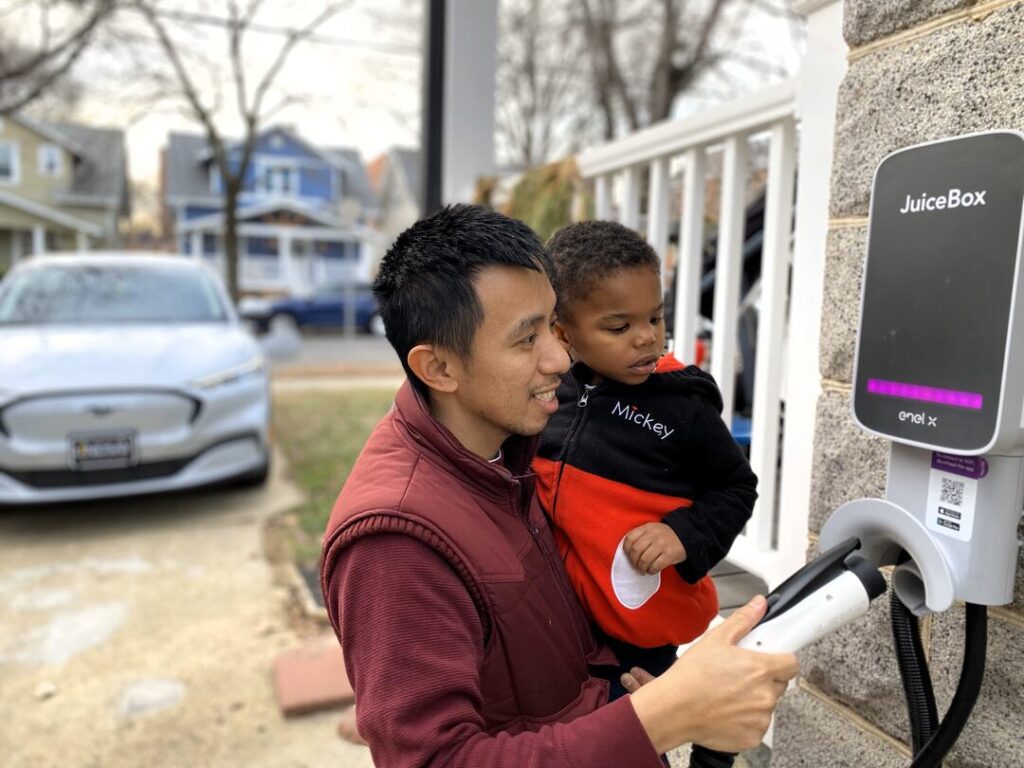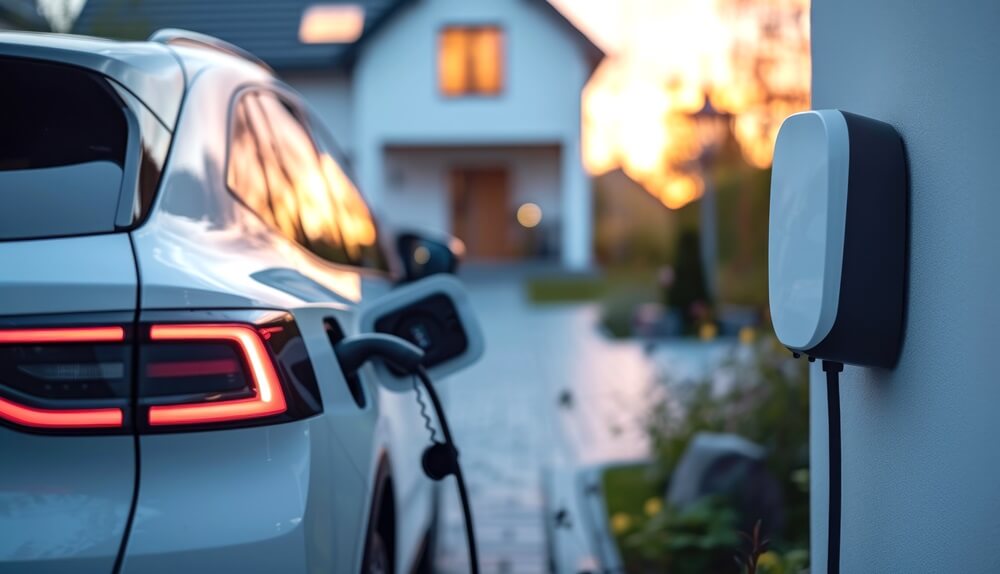If you already have solar and an electric vehicle (EV), you know how great it feels to power your car with the sun. But did you know that an at-home EV charger is eligible for both federal and DC tax credits? In DC, you can get up to $2,000 back between federal and state incentives!

Credits are available for both residential and commercial sites. Here at Uprise, we have several choices of great EV chargers for your home EV charging needs, and we’re happy to help you out with the information you need to file for federal and state tax credits.
Residential EV Chargers
The federal tax credit covers both hardware and installation costs and covers 30% of project costs, up to $1,000. The historic Inflation Reduction Act (IRA) of 2022 extended this credit through 2032. Some new additions through the IRA include:
- Requires paying a prevailing wage to install qualifying equipment
- Allows bidirectional charging equipment
These changes shouldn’t affect you unless you are interested in bidirectional charging, a technology which is in its infancy, but offers great promise for solar owners. It allows you to store and use renewable energy in your home at any time through your car’s battery. There’s a really cool pilot program happening in Maryland right now! Read about it here.

Commercial EV Chargers
Businesses and other organizations that install EV chargers at their facilities can qualify for an incentive of up to 30% of the cost. The extension also has a few changes for installations completed after December 31, 2022:
- Requires projects pay the prevailing wage for labor and meet certain apprenticeship requirements.
- Limits the availability of tax credits to installations completed along approved census tracts, typically low-income or non-urban areas. See the census tract map here. (Most of DC is covered.)
- Allows for bidirectional charging equipment.
- Allows for direct payment of the credit amount to tax-exempt organizations like schools, nonprofits, and government buildings.
How To Get the Federal EV Charger Tax Credit
Claim the 30C Tax Credit by submitting form 8911 (see the form here) during your annual tax filing. You can review full guidance from the IRS at this site: IRS Guidance 8911.
- You will need your receipts that show the purchase price of the EV charger and any installation fees. If Uprise installed your charger, we’re happy to provide you with the needed documents.
- You will also need to know your tax liability for the year you’re claiming the credit. That’s because the EV charger tax credit is subtracted from any federal tax you might owe on that year’s return. If your liability is not enough to cover the credit, you can roll the rest over to the following tax year.
Also, the EV charger tax credit isn’t a refundable tax credit, so you won’t receive cash back as a result of claiming the credit.
Make sure to take advantage of local tax credits too!
It’s important to remember that the federal tax credit is just one of the incentives available for customers. On top of that, you may be eligible for rebates from your state, utility, county, regional organization, or municipality. In fact, 63% of the country currently qualifies for a rebate for installing EV charging equipment.
District of Columbia EV Charger Tax Credits
Washington, DC offers a tax credit of up to $1,000 to help cover the cost of installing an EV charger at a private residence. This credit is 50% of the allowable costs for equipment and labor, and can be combined with the federal tax credit.
DC also offers a credit of up to $10,000 for installing an EV charger on non-residential property that’s open to the public. Any unused credits can be carried forward for two years.
The Details
Alternative Fuel (includes Electric Vehicles) Infrastructure Credit
- The Alternative Fuel Infrastructure Credit is a credit of 50% of the allowable costs to purchase and install alternative fuel storage and a dispensing or charging station at a private residence, or on non-residential property designed for use by the public.
- The credit shall not exceed $1,000 per station at a private residence and $10,000 per station on non-residential property designed for public use.
- Any unused credits can be carried forward for two years.
- More resources are available at the Office of Tax and Revenue.
How To Claim Your DC EV Charger Tax Credit
If you are claiming one of these credits, complete the Residential Alternative Fuel Conversion and Infrastructure Credit for Individual Income tax return filers and attach it to the D40, with Schedule U. You can find these forms at the DC Office of Tax and Revenue website.
You can find more information about DC’s EV tax credit on the Department of Energy & Environment website.
Check out the Database of State Incentives for Renewables & Efficiency for more local incentives in the DMV.
Give us a call with questions!
We’d love to help you get set up with an EV charger. Call us today at 202-750-7581 or fill out the form on our website to learn more!
